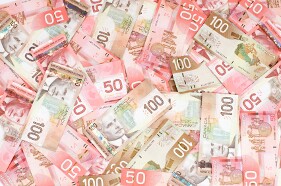The Canadian dollar hit the pause button on its recent rally after the federal government released its gross domestic product (GDP) reading early for the first time ever. The loonie is slumping on news that economic activity suffered the biggest monthly decline in history. With falling energy prices and accommodating central bank, it could be a downward trend for the Canadian dollar in the near-term.
According to Statistics Canadaâs flash reading, the economy contracted 9% in March as the COVID-19 pandemic shut down businesses and halted consumer spending across the country. The statistics agency is not scheduled to release its GDP figures until later this month.
Early indicators suggest that retail sales data, manufacturing output, and the unemployment rate will continue to worsen over the next two months. Last week, Ottawa confirmed that the coronavirus killed more than one million jobs last month.
The Bank of Canada (BoC) held its March policy meeting, and policymakers left interest rates unchanged at 0.25%. Officials unveiled a new provincial bond-buying program worth $50 billion as jurisdictions suffer from a tidal wave of debt and economic inactivity.
The central bank noted that its projections show the near-term downturn will be the âsharpest on recordâ as the economy is anticipated to contract 15% to 30% in the second quarter. The BoC believes that the economic recovery depends on containment efforts and bringing the pandemic under control.
If market conditions improve, the economic shock is expected to be âabrupt and deep but short-lived.â Overall, there could be a strong rebound for most sectors and industries, though some could endure bearish conditions for the foreseeable future.
Energy prices continue to weigh on the loonie. May West Texas Intermediate (WTI) crude oil futures tumbled $0.12, or 0.6%, to $19.99 per barrel on the New York Mercantile Exchange. June Brent crude futures plunged $1.51, or 5.1%, to $28.09 a barrel on Londonâs ICE Futures Exchange. May natural gas futures also slipped $0.03, or 1.82%, to $1.62 per million British thermal units (btu).
Any significant change in energy prices impacts the national economy since crude remains its top export.
The USD/CAD currency pair surged 1.51% to 1.4083, from an opening of 1.3882, at 14:20 GMT on Wednesday. The EUR/CAD climbed 0.56% to 1.5324, from an opening of 1.5238.
If you have any questions, comments, or opinions regarding the Canadian Dollar, feel free to post them using the commentary form below.

Canadian Dollar Plunges As GDP Contracts 9% in March, BoC Unveils New QE
More from NewsMore posts in News »


Be First to Comment